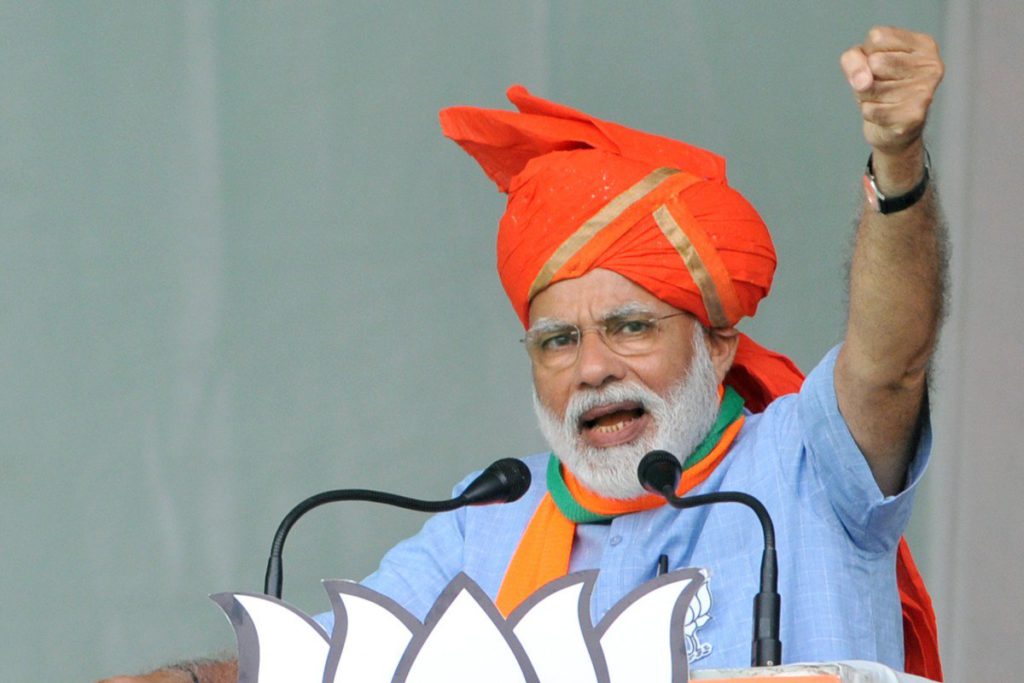[Analytics] An India-China trade war? Modi fans the flames of boycott calls

Indian Prime Minister Narendra Modi. Photo: Xinhua
The influential Confederation of All India Traders, which has 70 million members, is calling for a boycott of Chinese products. But most experts say any such action would hurt India far more than China. Vasudevan Sridharan specially for the South China Morning Post.
Indian traders calling for a boycott of China-made products have been encouraged by an interview in which Prime Minister Narendra Modi says the matter is for the public to decide.
“As far as public sentiment on Chinese goods is concerned, we should leave it to their sooj-bhooj [wisdom]. We, including the media, should guide the public,” Modi told Network18 last week, in comments that have played into the hands of the influential Confederation of All India Traders (CAIT), which has 70 million members and is encouraging traders, importers and consumers to shun Chinese products.
As its cause célèbre, the group is using Beijing’s decision to veto the UN Security Council from declaring Masood Azhar – chief of the extremist group Jaish-e-Mohammed responsible for the Pulwama terror attack that killed 41 Indian security forces – as a global terrorist. However, its underlying complaint is that China-made products are hurting small-scale industries in India.
Despite most analysts cautioning that any boycott would be unlikely to work and would hurt India more than China, the CAIT has seized on Modi’s comments – made as India’s five-week election process begins – to galvanise support for its cause.
Last month, to mark the Holi festival, domestic traders made tiny hills of Chinese-manufactured goods such as toys, clothes, and electronics in some 1,500 locations across the country and set them on fire. In the capital New Delhi, campaigners burnt items at Sadar Bazar, a popular hub for selling Chinese goods.
WHY SO ANGRY?
CAIT claims Chinese exporters indulge in unfair trade practices, cut corners on quality and costs, and pay fewer taxes. It says this leads to an unfair playing field for India’s smaller traders – the lifeline of the country’s manufacturing sector, and ultimately threatens millions of jobs.
The group has urged the nationalist Modi administration to impose harsh custom duties ranging from 300 to 500 per cent on Chinese products while demanding heavy penalties for any violation.
Praveen Khandelwal, the secretary general of CAIT, has said the price difference between Chinese and Indian-made products is anywhere between 30 and 40 per cent across a range of items like toys, watches, electronics, festival materials and hardware tools.
“Chinese firms operate with a sinister design. We’ve requested the government break the nexus between [the Chinese] importers and officials at various ports, who help foreign firms breach regulations.”
The group’s gripes are long-standing. Pro-nationalist groups linked to the ruling party launched similar calls in 2016 and repeated them during the Doklam border stand-off in 2017. But its latest campaign has lasted for several weeks, with the #BoycottChineseProducts trending on Twitter.
WHAT’S AT STAKE
Given that China is India’s largest trading partner, the boycott calls have the potential for making serious problems for Modi. Chinese investments in Indian start-ups surpassed those in the US and Japan last year, clocking US$5.6 billion – up from US$3 billion in 2017. Four out of five top smartphones in India are manufactured by Chinese firms and India imports more than US$10 billion worth of telecoms equipment every year from China.
In 2018, India imported about US$76 billion worth of goods from China – chiefly for the electronics and garment industries – while it exported US$18.8 billion worth of items, mostly raw materials.
While China’s exports to India have steadily but notably increased in recent years, while India has been left struggling to keep up. India’s last trade surplus with China was in 1992-93.
Also, New Delhi is concerned about the ballooning trade deficit, which stands at US$58 billion in Beijing’s favour. India’s newly appointed ambassador to China, Vikram Misri, has said that reducing the trade deficit will be his priority and he will press ahead with efforts for greater market access in China for Indian agricultural products such as sugar and rice.
WHAT NEXT?
China’s exports to India represent just two per cent of its overall global exports and any official boycott by the Indian government would be unlikely to pinch Beijing. New Delhi knows this. Foreign trade experts mostly agree that a trade war-like scenario unilaterally peddled by New Delhi would hurt India more than China.
“I think there’s no point in reinventing the wheel and India should focus on boosting its software and intellectual services, rather than attempting to do what China already does best. Plus, the boycott call will have no or negligible impact on the ground,” said Sanchit Vir Gogia, chief of the advisory firm Greyhound Research.
Indian vendors and consumers have no real incentive to shun Chinese products – which are both competitively priced for consumers and ubiquitous in the market – except to rally behind a nationalist cause.
Nonetheless, the calls for a boycott have not gone unnoticed in Beijing, with the state daily Global Times recently cautioning against the idea. Citing analysts, the newspaper warned, “Any resistance against Chinese goods by Indians would be unwise and ineffective, and it would almost certainly cost India future opportunities.”